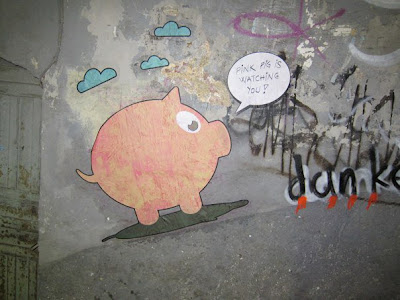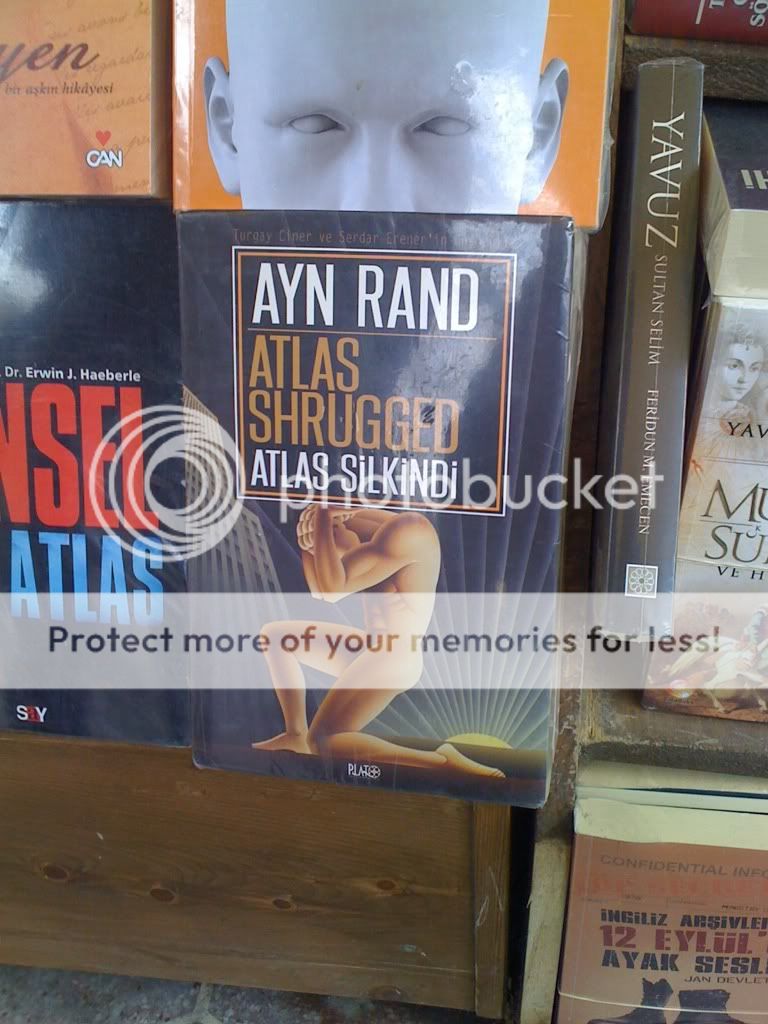After spending some time in Istanbul this spring break I think I started to understand a little better one of the major problems with the attempts to spread liberty here, as well as throughout what I will vaguely call Europe and a good part of the world. The political scene here is set up in an incredibly unique way. You don’t have “liberal” and “conservative” as I’m used to. Rather, you have the incredibly statist but very modern/secular CHP party (this is the one that follows the legacy of the Kemalists and Mustafa Kemal Ataturk) and the traditionally conservative and more religious but currently liberalizing opposition party: the AK Partei. This group identifies more with the hinterland and the more conservative religious population there. Finally, you have a loose network of the academics and subversives who tend to be from what I’ve seen unremittingly socialist. This is the group that takes the stronger stance against the CHP. My experience with all of this is quite fleeting, and of the three groups I only really got to talk to socialists. One of my professor’s friends we met is a socialist and an academic in Turkey. We met him at the Baklahorani festival, which is the Greek-Orthodox version of Mardi Gras or Carnival. He’d come out to support the stand the Greek community here was taking for the first time in about 70 years against the anti-minority policies of the Kemalists and their descendants throughout the past hundred years. He spoke harrowingly of his family’s own experience at the hands of the earlier Kemalists during massacres against Circassians. This history had influenced his decision to stand with the socialist opposition. The second socialist I got the opportunity to talk with briefly about politics (this wasn’t exactly something we were supposed to talk about because of the tensions still present) was a Greek-American writer for Time Out Istanbul who is working and living in the city. She is writing a novel about the anti-Greek pogroms that occurred in Turkey and identifies as most of the Greek community she works with does, as a socialist with a strong pro-feminist stand.
Graffiti was super-prevalent as well, a lot of it was political. I have no idea if this was? |
Both the CHP and the conservative opposition pose huge problems for these groups for reasons that I think are readily apparent. Joost Lagendijk, a senior analyst for the EU seemed to think so too. He gave us a lecture on Turkey’s attempt to join the EU and in his view the pro-business, bourgeois AKP supporters had stopped progress toward EU membership by abandoning some of the women’s’-rights and GLBT reforms that the EU demands of its member states. They have dropped some of these important reforms and can truly and accurately be called a conservative movement in this sense despite giving concessions recently (these are mostly thought to be a tool to avoid opposition from those who would call them pro-theocracy). It is interesting to note that this seems to be assumption among a good amount of students as well. We sat in on a lecture at Istanbul’s Bilgi University and everyone seemed to be on the same page as far as the connection here as well as that between imperialism and capitalism. I found it kind of strange that this was accepted as a given, that the two go hand in hand and aren’t much different. This Marxist assumption went over quite well with a good number of the students from American University I was with (big surprise there) but I saw a few problems with this framework.
The professor giving the lecture had asked us to try and see what the difference was between European funding of US railroads and European (and American) funding of railroads during the Ottoman empire. During the Ottoman Empire this is largely seen as an Imperialist ploy to gain control of the region, including the vast oil fields rapidly becoming important in the south of the empire. His goal, it seemed, was simply to point out that not all investment, even that commonly accepted as imperialism, was necessarily imperialism. He wanted his students to look at what they are taught to see as imperialism very closely and critique whether this actually is imperialism or not. This seemed like part of the general higher educational goal now developing that seeks to undermine the Kemalists arguments for “Turkification” which includes anti-minority rhetoric and the like. However, one of my colleagues from AU seems to have mis-interpreted the question (or perhaps he simply took advantage of the opening to say something he wanted to say) and said that it was imperialism in the US as well because of the role the railroads played in keeping the native Americans down. He then went on to talk about the imperialist “robber-barons” of the railroad development era in American history and how the US government was so wonderful for stopping these robber barons and nationalizing the railroads. The other students in the class seemed to be in quite easy agreement with this analysis, and drew parallels to the use of railroads to abuse the poor and minorities in Turkey as well. The class turned pretty much into a bashing session of capitalism in general and its big brother –imperialism.
Personally I don’t see the building of railroads as such a terrible thing. I think the professor had a good point initially that maybe this wasn’t truly imperialism; indeed it helped the Ottomans immensely at the time and was chosen because it was seen as beneficial to them. I see investment in things like railroads, or any technology and innovation for that matter, as a beneficial process, creating wealth and aiding economic growth. I see the problem very differently from my colleague. Rather than being an issue of big business abusing the little guy, foreign investments only truly become imperialist when the governments of the imperialists get involved. Investment to railroads is no problem unless the government of an imperialist incentivizes those railroads in order to use them for an ulterior motive. The British incentivized railroad building in the Ottoman Empire in hopes of commandeering some railroad use in order to pump oil away from Mosul. The US government sold huge swathes of land far under price to railroad companies to force the railroads into areas that needed to be “settled.” It should be duly noted that removal of native populations was a government policy at the time, and the railroads were used as a tool of the state to force native populations of their land. Even in Turkey the use of railroads to aid the government in mass deportations of Kurds (brought up during the class) did not spring up simply because the railroads existed, but because the government demanded free use of them and used them as a tool for this policy. This is the key to the question initially asked: German investment to US railroad companies was not imperialist precisely because the German government wasn’t involved. German companies invested hoping to gain profits and did, helping the development of US rail in the process. What made this different from the Ottoman example was the lack of an imperialist government pushing behind the investment, waiting to scoop up whatever resources could be found. But rather than recognizing capitalism as a solution to the problems of imperialism it is commonly accepted as being beholden to the same interests. The only solution considered to imperialism as well as authoritarianism is socialism, and that is what makes the spread of liberty so difficult.
This limited view of possibilities causes the role of the government to be seen as a two-sided issue not only here, but from what I have heard and seen, throughout Europe (if I can say one thing with some confidence now it is that Turkey, or at least Istanbul has quite a legitimate claim to EU status, the place seemed incredibly European to me). The assumption is that the state either actively represses or actively tries to promote society. The idea of a passive state is just something completely off the radar. Just like we deal with the issue of left and right here in the US, the false dichotomies of politics limit how receptive people are to the message of liberty worldwide. Some of the glimmers of liberty that I did see here were the protests that seemed very common and prevalent. The willingness of a people to stand up for things that matter to them and express themselves is an important foundation for liberty and I greatly respect the people there for being willing to stand up for things and risk retaliation, if only more Americans had that kind of courage.
That said, the oppression that still exists there was not incredibly apparent in the streets and the city was comfortable to live in without feeling like you were under too much surveillance. The one thing that I did see was that the police were everywhere. And while I never really witnessed them doing much, the potential for them to act quickly and decisively was readily apparent. Their presence was almost definitely felt. The only truly creepy statist thing I saw, as the Bank Museum. A museum (shrine?) to the Kemalists’ “Iş” Bank the building was very clean and well organized, however, unlike any other museum we’d seen, it was empty. Looking through the exhibits and garnering what I could from the Turkish info plaques the bank was mostly seen as a wonderful and amazing modern feat. This is, notably, the same state bank whose policies were partially responsible for the hyperinflation and the rapid devaluing experienced by the Turkish lira earlier in the century. The creepiest part of all was the running of old bank advertisements which had the eerie air of delusion about them. You know the feeling, when an ad cheerily tells you that everything is just fine and beautiful while the world crashes and burns around you. Kind of like the feel of the old 1950s stuff that studs the landscape of Fallout. (They go for a different feeling now). Later that day I felt better when I found a copy of Atlas Shrugged in Turkish as the book bazaar. I considered buying it, but figured it would do much more good by staying there than coming back to the US with me (not that we don’t have work to do here too). All said the problem of 2-sided politics is just as prevalent outside the US as it is here; it’s just that the sides are different. I for one am fed up with Libertarianism getting lumped in the middle as a sort of “moderate” standpoint, because it really isn’t. As a friend of mine once put it, “you don’t want compromise; you just want the third extreme.” Yes, as a matter of fact, that third extreme is the one for me.
A glimmer. |


No comments:
Post a Comment